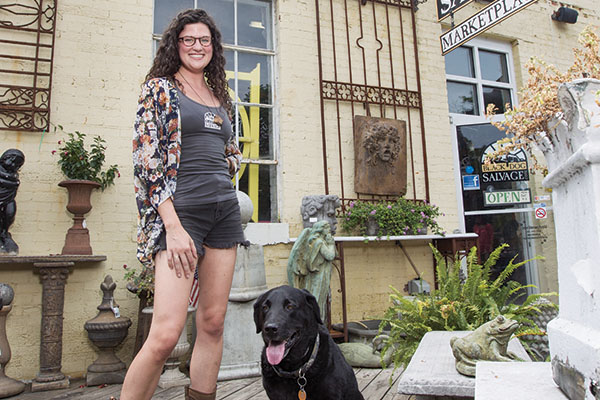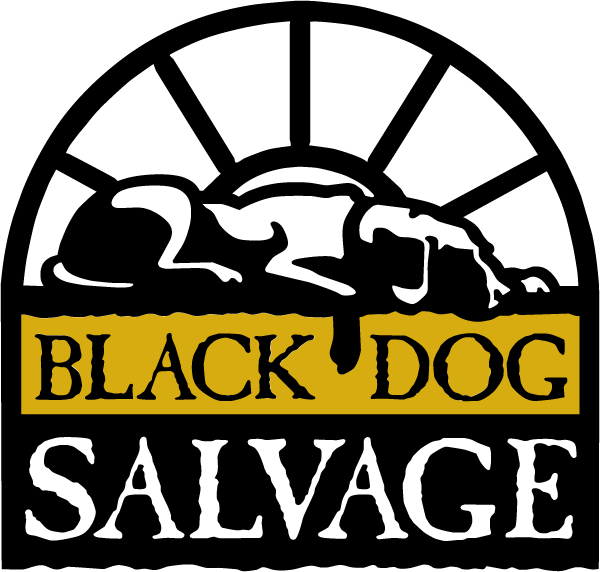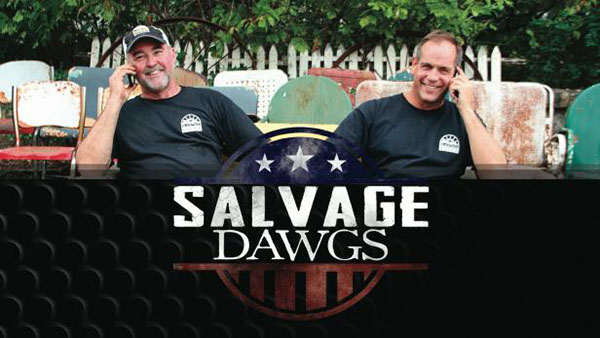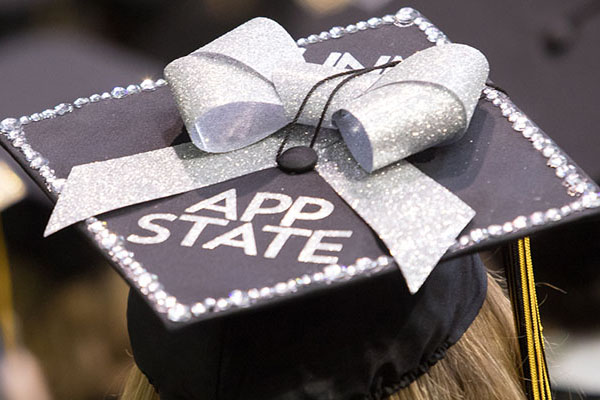Appalachian State University alumna Grayson Goldsmith ’11 describes how her work at Black Dog Salvage in Roanoke, Virginia, is a natural extension of her Sustainable Development degree.
Appalachian leads in creating a world where environmental, societal, and economic qualities exist in balance to meet the resource needs of today and of future generations. Our community of students, faculty and staff continually advance our understanding, capabilities and practices in this vital journey. As an institution of higher learning, we lead and educate by example, inspiring new generations prepared to share this knowledge, ingenuity and passion.
Grayson appears regularly on the DIY network show Salvage Dawgs.
What do you think?
Share your feedback on this story.
About Appalachian State University
As a premier public institution, Appalachian State University prepares students to lead purposeful lives. App State is one of 17 campuses in the University of North Carolina System, with a national reputation for innovative teaching and opening access to a high-quality, cost-effective education. The university enrolls more than 21,000 students, has a low student-to-faculty ratio and offers more than 150 undergraduate and 80 graduate majors at its Boone and Hickory campuses and through App State Online. Learn more at https://www.appstate.edu.
Transcript
Grayson Goldsmith: I’m from Roanoke. I grew up here, born and raised, and I moved away when I went to Appalachian State. So, that was four years away in a place that felt like home. It had a lot of the same vibe that Roanoke does, and that was one of the things that drew me to Appalachian in the first place. I didn’t think I’d be in Roanoke as long as I have, but I’ve found this awesome job at Black Dog, so here I am.
GG: So, Black Dog Salvage is an architectural salvage company, which means we go out into the field when buildings are condemned - schools, houses, churches, we’ve done a jail, we’ve done amusement parks, I mean, you name it. The weirder the better. We go in and take the reusable architecture and we bring it back here and we sell it - either to be reused, as a door, for example, again, or we might repurpose that door into another piece of furniture. We’ve got a custom shop downstairs, a metal shop and wood shop. But you’ll see light fixtures from all sorts of time periods hanging everywhere. Obviously a ton of woodwork, tiles, sinks, clawfoot tubs, stained glass, garden statuary, fountains, crazy whimsical things from an amusement park. You know, many stories.
(Caption) Since 2012, Black Dog Salvage and their day-to-day operations have been featured on the reality show “Salvage Dawgs” on the DIY Network.
GG: It’s really fascinating how the show has progressed and how people have I mean, literally, from all over the U.S. are coming to see us. And when I started there was only like 10 or 11 people, and now we’re about 31.
Robert Kulp, Co-Owner, Black Dog Salvage: You know, we hired her to work, and she turned out to be great at work and great on TV too, so it was a fortunate hire.
Mike Whiteside, Co-Owner, Black Dog Salvage: It’s been fun to watch her grow, because from the first time she was on TV - real scared, and not knowing what to say, and now she’s -
RK: You can’t shut her up.
GG: I’m camera shy, so being on the show for me, at the beginning, was a bit nerve racking, and I was so nervous about being this girl in the field. You know, I didn’t want to seem helpless or weak. Once I got a sense of what we were doing and how to do it, I realized that like it didn’t matter if I was female or male or whatever, I’m going to do it my way, and that’s okay. I mean we have our own ways of doing things, and our own viewpoint, it’s all a balance, right? The Yin and Yang.
GG: I started school in 2007, and I thought I was going to study Geology, and I’m taking courses and I’m loving it, and about two years in, I realize I don’t want to be a geologist. So, I started looking around for other majors, and at the time, Sustainable Development had just become a major option at Appalachian. I thought to myself, what was the most important thing to me, and that was the next generation. And the whole foundation of Sustainable Development is being able to develop so that the current generation’s needs are met, without compromising the needs of the next generation. And what, really, is more important than that? You know, I mean, being a steward of that kind of responsibility, I think, is really important, and an honor.
GG: So, for Black Dog, I go out in the field when we have a salvage job, and I’m actually getting in the dirt and grime and taking apart things, and it’s so much fun. But when I’m not in the field, I’m here, either working at the front counter, selling salvage, or organizing the salvage jobs. I’m helping to vet the emails that we get.
RK: Grayson really is on the front end of most of our projects - in other words, she is the gatekeeper. She gets the first look when somebody calls up and says, “hey, I’ve got this…”
GG: I sort of feel like the guys are there to do the work, and do the job, and I am too, but I also have a little bit more patience, I think, with the owner who has this emotional attachment to what we’re ripping apart. And usually, it’s something very personal, like someone’s home, someone’s grandparents’ home, their great grandmother or grandfather built this place, it’s a farmstead, it’s been in the family… It’s very emotional to see it go.
RK: It’s a destructive process that we’re in. It’s kind of like, it’s kind of tough to watch sometimes, so we have to ease the edges a little bit.
MW: You have to be sensitive - you’re dealing with people’s lives that are history. You know, we’re taking something down that’s connected to the community and/or individuals, and you have to be respectful of that. And Grayson really helps us - I mean, Robert and I have done it for years, and Grayson does that too, but she does it with her personality and we’re all sympathetic to the history. And you have to be -
RK: She just does it better.
MW: Yeah, okay, I was trying to skirt around that, but it’s pretty obvious.
GG: I love listening to their stories and their history. There’s always a story. And so, I get to talk to them face-to-face, and comfort them, knowing that this stuff is being respected, and we really appreciate it, but they are almost tearing up when they know it’s going to live on in another way, another form, just get reused. They’re like, “I don’t care what happens to it, as long as I know it’s not being burned or being put in a landfill.” They are worldly things, but they have sentimental value, I think. Save what you can.
MW: Well, our business is, in its core, is recycling. So the sustainability is reuse - that’s one of the components of that particular genre, is don’t throw it away. Figure out how you can capture the energy that was put into that particular piece - for what it was intended to be, or for an upcycling job, because that energy, once it’s thrown away, is lost. And that, really in its core, is sustainability.
RK: One of the conversations I had with her about her degree - that was one of the things she said it was really about, was not only, “hey, let’s just recycle,” it’s much deeper than that, and it’s based on the fact that the only way that kind of effort can be sustained is for people to be sustained by it.
MW: It’s got to make a living. Just out there saying you’re going to do it is one thing, but making it a lifestyle, a way of making a living, then that becomes sustainable in its own right. It’s got momentum, it’s got the ability to provide salaries, and livelihoods for the people involved in all the ancillary things that are happening around it.
GG: One of the main principles, the main principle, probably, of sustainable development is the emphasis on social equity, environment, and economics. And what I do here at Black Dog is, we are working in a business, so obviously our aim is to make a profit. But we also are salvaging reusable and repurposing architecture, and keeping that out of our waste streams. You know, things that would have ended up being in the burn pile or landfill, essentially. So, it feels right to be working somewhere where I’m kind of contributing to that social change. Yeah, I feel good about what I’m doing, and I believe in the work that we do.















